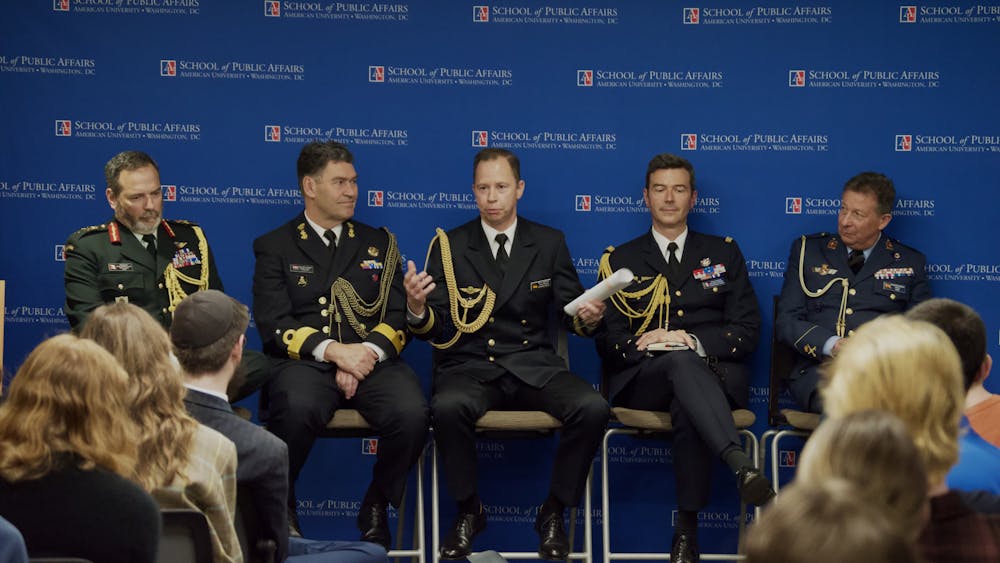Professional Wargaming at American University and AU’s Transatlantic Policy Center hosted senior defense attachés from Canada, France, Germany, the Netherlands and Spain to celebrate the 75th anniversary of NATO and to discuss the current and future actions of the alliance at a panel on April 10.
The event began as moderator Ben Mermel, a graduate student in the School of Public Affairs and vice president of Professional Wargaming, asked each attaché about their military career and experience, giving them a chance to discuss their country’s history and current work with NATO.
Maj. Gen. Michel-Henri St-Louis, the Canadian defense attaché to the United States, spoke of his long history of service for Canada and NATO, specifically how the alliance has evolved throughout his career.
“The NATO I joined did not have 32 members,” St-Louis said about the new countries in NATO. “Again, I apologize, but there are some countries in the alliance today that I could have never thought would be in the alliance when I was your age, either studying military history or when I joined as a lieutenant.”
“We are so glad that the alliance is what it is today with two new additional Scandinavian countries joining this year, but this is just to give you a sense of how the world has changed from my service and my time in uniform,” St-Louis said.
Rear Adm. Axel Ristau, the German defense attaché to the U.S., said Germany will emphasize burden sharing, “the extent to which allies are sufficiently contributing to common defense” at the NATO summit, which will take place in D.C. July 11 and 12.
Rear Adm. Sebo Hofkamp, the defense attaché to the U.S. for the Netherlands, spoke of the country’s efforts to rebuild and reinvest in their army in light of Russia’s 2014 invasion of Crimea and the post-cold War era when countries spent less money on their militaries.
“We got rid of most of our defense forces. So from 1000 tanks, we go to zero tanks. From 20 frigates, we go to six frigates. From 150 F-16s, we go to 76. So basically an army of 200,000 people to an army of 40,000 people,” Hofkamp said. “So you can imagine that we came a long way, as I’m standing here now in 2024 because, in 2014, everything was changed by the invasion of Russia in Crimea, part of Ukraine.”
Mermel then opened up the conversation for audience members to ask the attachés questions. One audience member asked about how NATO member countries contribute to the training of Ukrainian soldiers given the uptick in Russian drone attacks in Ukraine.
“The lessons learned, as we see in the Ukraine, have a large impact, especially the effectiveness of sea drones,” Hofkamp said. “As a Navy guy, I know how difficult it is to defend a large capital ship against a small, moving target because for the radars, the reflection of the sea is difficult and if you cannot track them, you cannot fire on them … The lessons learned from Ukraine are being immediately incorporated into our tactics and new orders for other equipment.”
St-Louis also said that all of Canada’s training efforts across Europe are focused on helping the Ukrainian forces, which allows the Canadian troops to learn from Ukrainian soldiers and integrate those lessons into training.
Ristau spoke about the medical training that German troops have been providing to the Ukrainian forces and how an “infrared signature” of wounded soldiers can be picked up by Russian drones, which has since been incorporated into Ukrainian forces training.
Another student asked about the implications of the upcoming 2024 presidential election, specifically if former President Donald Trump were to be elected, given concerns that he would pull the U.S. out of NATO.
“I would suggest to you that the world is better when the United States plays a leadership role,” St-Louis said. “The world’s prosperity, our country’s prosperity, our alliance’s prosperity are better when we rely on the leadership of the United States and it is a heavy burden that your country carries. ”
Mermel said the event allowed students to hear from a broad spectrum of nations about NATO’s past, present and future.
“I think students got the chance to hear from several nations, which is unusual,” Mermel said. “At AU, we pride ourselves on being very internationalistic, certainly the School of International Service and the Transatlantic Policy Center have been a big help in broadening students.”
The event was a unique opportunity to hear from high-ranking military officers, and this experience is “completely unlike any” from other universities, Mermel said.
“These attachés have not spoken at any other university in the United States together like this,” Mermel said. “This is well and truly the only group of students that have had this kind of access.”
“We like to expose students to the national security leaders of today, so they can become the national security leaders of tomorrow,” Mermel said.
This article was edited by Samantha Skolnick, Tyler Davis and Abigail Turner. Copy editing done by Luna Jinks, Isabelle Kravis and Ariana Kavoossi.





